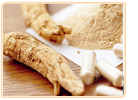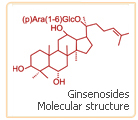How does Ginseng work?
 Cultures around the world use ginseng for many different reasons, ranging from counteracting the effects of menopause to improving stamina. Cultures around the world use ginseng for many different reasons, ranging from counteracting the effects of menopause to improving stamina.
Ginseng is beneficial because of its unique chemical properties. A compound called ginsenosides, a steroid-like compound, helps to improve strength, energy, and vitality. Also, as a phytoestrogenic herb, ginseng contains human-like hormones that can help restore hormonal balance in menopausal women.
It is important to know what is in ginseng to fully understand how ginseng works. A breakdown of these properties continues below.

Ginseng Properties
Ancient cultures have long held ginseng in high regard for its curative properties. Its ability to improve stamina and strengthen the body's immune system have basis in fact.
Ginseng is the only herb that contains a chemical compound called ginsenosides.
Siberian Ginseng
Eleutherococcus Senticosusis was marketed as a ginseng because it contains Eleutheroside, which has very similar herbal properties.
Ginsenosides are similar to the steroid-like compound triterpene saponins, and they provide ginsengs� beneficial properties. Research about ginseng is constantly updated because ginsenosides have been found to affect multiple pathways in the body, and subsequently, produce differing effects.
To learn more about this please continue reading.
How Ginseng Works With the Body
Ginseng interacts with the body in two ways; the first way is via a compound called ginsenosides. This compound is only found in ginseng and can be split in two groups: Rb1 and Rg1. In the Rb1 group there is a steroid molecule (Ginsenosides-RC) which has been shown to stem the growth of cancer cells. Ginsenosides are also known as an adaptogen that can boost stamina and energy in humans. The Rg1 group of ginsenosides is also capable of protecting against memory loss.
The second way that ginseng interacts with the body is on a hormonal level. Hormones play a vital role in bodily functions. When women mature, their hormone production decreases (especially estrogen), resulting in symptoms commonly associated with menopause. Ginseng increases low levels of estrogen by substituting human hormones with phytoestrogenic hormones. Because phytoestrogens are botanical compounds with a similar chemical structure to estrogen, they can improve the hormonal system of menopausal women.
Now that the way in which ginseng works has been explained, please continue reading to understand how ginseng is used.
Conclusions about Ginseng
Ginseng is great for treating some menopause symptoms, but has recently been criticized because it adds artificial hormones to the body. In so doing, ginseng can trigger side effects including serious illnesses such as breast cancer.
Other alternative treatments are just as effective as ginseng, but without the side effects. Non-estrogenic herbs, for example, are a great option for treating menopause symptoms. Read more in the following article.
Which herb should women try? Today women are looking for relief from their menopause symptoms with herbs. Phytoestrogenic herbs and non-estrogenic herbs are good in relieving menopause symptoms, but recent studies show that non-estrogenic herbs have no side effects because they help the body to produce its own hormones instead of introducing hormones like the phytoestrogenic ones. Learn more about non-estrogenic herbs for menopause. | 

